Freedom
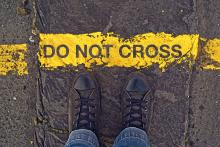
Pentecost celebrates the giving of the Holy Spirit and reminds us that our story isn’t static but dynamic, alive, and unfolding. In the same way that the disciples moved out from Jerusalem after Pentecost, we are to move out of our places of comfort and complacency as we join God in the world he is making.
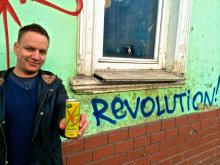
Intending it as a compliment, a friend described my work in in Kiev last weekend as “selling sodas in Ukraine.”
He’s right. I was in the embattled city to represent a company I helped co-found and our Southern California energy drink brand in meetings with more than 10,000 Ukrainian independent business owners.
It was as simple as that and also so much more.
Like Bono, I believe free enterprise is a cure for all sorts of poverty — economic, political, and spiritual.

I stopped drinking Coca Cola years ago — not in protest but in a bid for health. But I want to applaud their presenting "America the Beautiful" sung in seven languages.
In a 60-second Super Bowl ad, and now a 90-second version at the bizarre Sochi Winter Olympics, the soft drink company showed people of different ethnic backgrounds singing in English and six other languages.
I found it charming and warming. It spoke eloquently to the America that I know today — and the America that my ancestors knew when they arrived many years ago speaking German and Norwegian.
These magazine articles and blog posts published by Sojourners through the years pay tribute to the great South African leader.
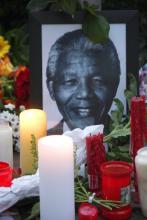
NELSON MANDELA was the most important political leader of the 20th century. While Roosevelt and Churchill helped protect the West and the world from Hitler’s Nazism, Mandela heroically exemplified the movement against the colonialism and racism that oppressed the global South, shown so dramatically in South Africa’s apartheid. And from a Christian point of view, he combined justice and reconciliation like no other political leader of his time, shaped by the spiritual formation of 27 years in prison.
Shortly after Mandela was released from prison, he came to New York to meet with a small group of Americans who had been involved in the anti-apartheid struggle, and I was blessed to join them. From the start, I felt in Mandela a moral authority I have never experienced with any political leader.
Attending Mandela’s inauguration in 1994 was a highlight of my life. We were picked up at the airport by friends, a couple who had both been in prison and tortured, but now she was about to become a member of the new South African parliament. We saw a group of the infamous South African security police. Having been interrogated by these thugs before, I immediately said, “Let’s get out of here!” To which they replied, “Don’t worry, Jim, they’re ours now.”
At the ceremony, joined by my South African friends, we watched Nelson Mandela announce his vision for a new rainbow nation. More than 100,000 people (and a billion or so more via TV) listened with tears in their eyes and great hope in their hearts.

No stones were thrown, even though these leaders thought they had the law on their side. Not one stone was thrown. Jesus turned the moment from pious religious rules to self awareness of grace, and each person with a stone dropped it and walked away. I think maybe because they realized life is all grace. Then that grace standing in front of this woman is given to her. The system failed, but life was given.

Tomorrow, millions of people across this land, will be celebrating our nation’s freedom. Many will be marking Independence Day by going to see the fireworks, watching Fourth of July parades, or just having a barbecue and enjoying time together with their family or friends.
One of the things I began doing a few years ago on the Fourth of July was to call a very special person in my life and in the life of my family. His name is Paul Anderson. Had it not been for Paul and his family, my family and I would not have been able to emigrate in 1987 from Poland to the United States. So on every July 4, I call Paul and thank him for helping me and my family arrive safely and settle in this country.
I tell him that he’s had an important part to play in so many good things I’ve experienced over the past 26 years that I’ve been living here — including discerning a Franciscan vocation and becoming a friar.
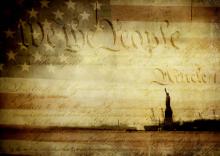
What do I love about America? I love the land, one of the most spectacularly beautiful countries in the world (and I’ve visited many of them). I love walking our long stretches of beaches, hiking our majestic mountains, seeing the desert skies, walking beside the rivers, sailing along the coasts, and visiting hundreds of lakes in my home state of Michigan, where I camped as a kid. I even love some of our big cities! “O beautiful for spacious skies, for amber waves of grain, for purple mountain majesties, above the fruited plains.” I love our many diverse cultures, including their music, their food, their art, their sports, and their particular stories and histories.
I especially love our best national values: freedom, opportunity, community, justice, human rights, and equality under the law for all of our citizens of every race, creed, culture, and gender, not just for the rich and powerful. In particular, I love our tradition and history of democracy, its steady expansion here, and how it has inspired the same all over the world. We take legitimate pride in seeing how our founding documents have been the models for many new nations.
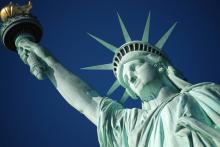
“If you love somebody, set them free. Free. Free. Set them free.” Of all the songs to come to mind during this Independence Day weekend, this one rings in my head. Sting, the artist, did not have America’s freedom celebration in mind when he coined these words. Honestly, the song has little to do with patriotism; it is more of a ballad of love lost and letting go. Nonetheless I dare to invoke it, as the words resonate with the spirit of autonomy that is so pervasive on July 4. “Set them free. Free. Free. Set them free.”
Each year at this time, our country focuses on liberty, the red-white-and-blue, and “My Country Tis of Thee.” I am grateful to live in the U.S. and the freedom this affords. Yet, what about persons who are not so independent — the unemployed who rely on federal subsidies, children whose schools are closing due to no fault of their own, and yes, the millions of Americans in the prison system? Although the Fair Sentencing Act of 2010 reversed the disparity between crack and cocaine convictions implemented by the Anti-Drug Abuse Act of 1986, the prison rate remains exorbitant. More than 2.2 million are still behind bars. The Texas execution rate is at 500 and counting. Forty-eight percent of persons in federal prisons were convicted of drug offenses, according to The Sentencing Project. A reversal in policy three years ago has not flipped today’s prison numbers. So many are not free.

THROUGH THE WRITER of the letter to the Hebrews we will be learning this month how the spiritual environment that upholds us as agents of God’s reign is richly, magnificently peopled. Entering into the spirit of this letter is like finding oneself worshiping in a great Byzantine church, in which the walls are blazing with frescoes and mosaics depicting the history of salvation and the saints in all their glorious variety. The writer extols the lineage of witnesses to God down the ages. We are asked to recognize them all as a crowd of supporters cheering us on. The writer insists that we live in vibrant awareness of the great and all-embracing community that God is forging. “But you have come to Mount Zion and to the city of the living God, the heavenly Jerusalem, and to innumerable angels in festal gathering, and to the assembly of the firstborn who are enrolled in heaven, and to God the judge of all, and to the spirits of the righteous made perfect, and to Jesus, the mediator of a new covenant” (Hebrews 12:22-24).
This is the antithesis of the bizarre theory that “religion is what the individual does with his own solitariness,” as the philosopher Alfred North Whitehead claimed. God is communion, as we try to express it in the doctrine of the Trinity. Life is interrelatedness. The baptismal creed of the church commits us to belief in the communion of saints because God recruits us for the struggle to build, sustain, and nurture community-where-God-reigns here on earth, as it is in heaven.
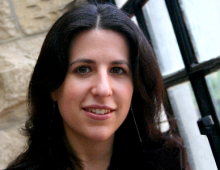
IN HER JEWISH school in Montreal, Ronit Avni learned the tragic history of her people. Her Canadian mother and Israeli father had met in the ’60s when her mother was living in Israel and working as a folk singer, often performing for Israeli troops. Her older sister was born in Tel Aviv, but the family settled back in Montreal in the mid-’70s before Ronit was born.
Not strictly religious but committed to the values of Judaism, Ronit couldn’t help but ask probing questions as she listened to the stories of the birth of the modern state of Israel in 1948. Am I hearing the whole story? How do Palestinian perspectives differ from what my educators and community leaders are teaching? How can we transform this situation from a zero-sum equation to one that respects the dignity and freedom of all?
Years later, having graduated with honors from Vassar College with a degree in political science after studying theater at a conservatory in Montreal, Ronit trained human rights advocates worldwide to produce videos as tools for public education and grassroots mobilizing.
By the time I met Ronit a few years ago, she had narrowed her worldwide focus to the Israeli-Palestinian conflict, where her heart was most deeply drawn. She is the founder and executive director of Just Vision, an organization dedicated to increasing media coverage and support for Palestinian and Israeli efforts to end the occupation and conflict without weapons of violence.
During the last several years, my engagement in the Holy Land has been significantly shaped by Ronit. Her film Encounter Point, about Israelis and Palestinians who have lost family members, land, or liberty to the conflict yet choose forgiveness and reconciliation rather than revenge, gave me hope that peace can emerge from pain.

AS THE SEAONS after Pentecost unfolds, we might think that summer calls for a kind of “church lite” in which we shouldn’t expect much to happen. With the dramatic commemorations behind us, the scriptures seem miscellaneous. But this season has its own purpose of soaking in the Word. Just let go of dependence on drama.
Our month’s reading opens in 2 Kings 5 with the healing of Naaman, the distinguished Aramean general, told with a dry humor that Jesus appreciated, since he specifically mentions it (Luke 4:27) in his teaching about faith found outside the bounds of Israel. At first Naaman’s dignity is offended by Elisha not bothering even to meet him in person. His pride receives a further blow in the ludicrous banality of the prescription that Elisha’s assistant passes on: “Go, and wash in the Jordan seven times” (verse 10). Naaman’s fuming about the short shrift he got, and the humiliation of being prescribed a business of splashing in a local stream, are quite comic. Paddling in the Jordan indeed—a ditch in comparison to the storied rivers of Damascus! Smiling, we recognize the storyteller’s shrewd knowledge of psychology. The tale has a good ending. Finally getting off his high horse, Naaman allows his aide to persuade him to try the simple bathing routine. Over time his skin is healed and rejuvenated.
The church behaves like that shrewd aide when it invites us to trust in the power of hearing the scriptures again and again, however overfamiliar some of them seem, and others obscure.
INTRIGUING AND believable characters are part of what makes Janna McMahan’s new novel Anonymitya memorable read. Through the story, which is set in Austin, Texas, the author provides a well-constructed and evenly paced plot that brings to light critical themes around home and homelessness.
Early in the story we discover classic contrasts between the two protagonists. Lorelei is a young, homeless runaway whose daily grind revolves around finding food and a warm, safe place to sleep, while Emily’s major mission centers on branching out from her bartending job to take up a more artistic endeavor as a photographer. One buys organic greens from the high-end Whole Foods Market, while the other seeks sustenance in restaurant dumpsters.
This interesting juxtaposition of characters reels us in. But as we swim through the thickening plot, we discover the startling similarities between the two: Lorelei’s rebelliousness and grit compared to Emily’s disdain for the superficial lifestyle of big-box shopping and Corpus Christi vacations; Lorelei’s refusal to seek help and get off the streets weighed against Emily’s desire to break from the overindulgence she grew up around. As Emily’s mother, Barbara, observes, “Emily liked the frayed edges of life, a little dirt in the cracks.” It should come as no surprise that Emily takes an interest in Lorelei’s hardscrabble existence.
So much about Lorelei remains a mystery, which serves to add tension and compel the reader forward. We sense she is searching for something, and there’s no way to prepare for the powerful punch McMahan delivers when we discover what Lorelei’s quest is about.
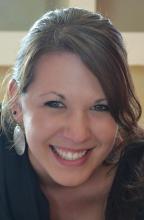
KRISTIN HART planned on moving to New York City to become an advertising agent with a sleek apartment and a stunning wardrobe. But one day all that changed. A humble missionary couple spoke at her church in Gainesville, Fla., about their experience fighting human trafficking in Asia, and after hearing the horrors of slavery, Hart knew she had to do something.
As she prepared to graduate from college in 2011, she applied for an internship with International Justice Mission (IJM), a Christian organization that rescues victims from trafficking and other violent oppression. A few months later, she found herself confronting the harshest cases of exploitation in south Asia.
“I saw people forced to work 18 hours a day, with their families taken from them,” Hart says. “I never imagined that humanity could be stripped from a person like that.”
MARTA AND LUISA had always fantasized about leaving their small town in northern Mexico to become dancers in a big city.
As the teenage sisters sat in the bed of a rusted pickup truck speeding toward the U.S. border, they thought their dreams would soon become reality. After sunset, the truck screeched to an abrupt stop. A middle-aged man with a skeleton tattoo on his arm hopped out of the driver’s seat, gritted his yellow teeth, and mumbled, “Vamos.” The time had come to complete the journey by foot.
Marta and Luisa walked closely behind the man and his two associates for hours along the desert paths they believed led to a brighter future. When they crossed the border into Arizona at about midnight, the tattooed man forcefully grabbed 16-year-old Marta and separated her from her older sister.
He explained that although he previously offered to help the girls cross the border for a small fee, the transportation cost had risen. Now Marta would have to work to pay off her debt. Alone.
Cecilia Hilton Gomez, director of Hispanic outreach programs for Free for Life International, describes the way that many human traffickers prey on vulnerable girls hoping to emigrate to the United States from Mexico and other parts of Central America. Since girls like Marta often have little education, lack formal paperwork, and have no knowledge of English, they become prime targets for traffickers looking to profit by selling women to brothel owners in the U.S.
“This is an epidemic, and it’s increasing,” Gomez states. “A lot of people think slavery has been gone for years, but it’s one of the largest criminal enterprises that exists now, and it’s right here in America.”

Editor's Note: Below is the text of President Barack Obama's Proclamation for the National Day of Prayer.
Americans have long turned to prayer both in times of joy and times of sorrow. On their voyage to the New World, the earliest settlers prayed that they would "rejoice together, mourn together, labor, and suffer together, always having before our eyes our commission and community in the work." From that day forward, Americans have prayed as a means of uniting, guiding, and healing. In times of hardship and tragedy, and in periods of peace and prosperity, prayer has provided reassurance, sustenance, and affirmation of common purpose.
Prayer brings communities together and can be a wellspring of strength and support. In the aftermath of senseless acts of violence, the prayers of countless Americans signal to grieving families and a suffering community that they are not alone. Their pain is a shared pain, and their hope a shared hope. Regardless of religion or creed, Americans reflect on the sacredness of life and express their sympathy for the wounded, offering comfort and holding up a light in an hour of darkness.

Some enterprises, like tech start-ups, are all dream and no structure.
A founder’s dream of making a world-changing product compels other pioneers to work long, self-sacrificial days. In what resembles religious fervor, they are like monks in constant prayer, hunched over computers, collaborating at white boards and talking shop deep into the night.
Investors, however, want structure and a return on their investment. So, eventually, do employees, who want stock offerings, benefits, and some sense that the dream has a future.
This awkward transition from dream-only to dream-plus-structure is where many enterprises fall apart. Freedom collides with accountability, jealousy emerges as some get better titles and more stock options and the freedom of “all in this together” gives way to stratification.
DURING THE unseasonably warm autumn of 1951, 22-year-old Martin King Jr. began his doctoral work in systematic theology at Boston University. Wearing his good suit in a stifling classroom, he was first introduced to the work of philosopher and ethicist Josiah Royce. King read Royce's well-regarded 1913 book The Problem of Christianity and wrestled with Royce's metaphysical values of loyalty, communitarian ideals, and the role of the individual within a group.
But don't let the high academic or philosophical language fool you. Royce was interested in only one thing: Love. It was the hidden heart of all his endeavors. And King began to study—and embrace—Royce's most important philosophical concept: the Beloved Community.
Though Royce had first written about the Beloved Community nearly 40 years earlier, King heard it in the context of his own time and place. He heard it in the context of the insidious Jim Crow laws of the South. In 1951 he also heard it in the context of the bitter race realities of the North. The July before King started classes at Harvard, a race riot had erupted in Cicero, Illinois, outside Chicago. A mob of whites attacked an apartment building that housed one black family, that of Harvey Clark Jr., a WW II veteran and bus driver who had moved into the all-white neighborhood.

Freedom is hummus. Perhaps not to you. But to me, hummus is what freedom tastes like. The relationships I have built with survivors of human trafficking have propelled me to redefine freedom, as it exists from their perspectives.
Watching a survivor taste hummus for the first time brought so much joy to me. In a room of 25 survivors, no one had ever tasted it; many were hesitant to even dip a chip in it, let alone a carrot stick or pita bread. But the wide smile on the face of the first survivor who ‘dove in,' was all they needed to form a new love for this strange chickpea blend. And that one smile led the rest of the women into a new world of ‘healthful’ eating. It was a bold move early on by one of our volunteers — but she knows that part of her volunteer work is to continue to introduce the survivors to freedom and choices that have been unknown and unavailable to them.

In the dark days of Advent, we wonder when the birth pangs will end: Will light break into the darkest corners of our hearts, our families, our lives? Will God—can God—take the twisted sinew of our warped world and redeem it? Will we—can we—hold on through the night? Can we trust that light to come? These are the questions of Advent.
As we enter the season of Epiphany, new questions arise: Will we allow the light that has broken forth to illuminate the darkest corners of hearts, our families, and our lives? Can we—will we—follow Jesus as he untwists the mangled metal of our shattered souls ... and redeems it? Can we—will we—trust the light or will we hide from it? These are the questions of Epiphany.
The light of Epiphany illuminates in two directions: It flashes inward, revealing our twisted and fragmented souls, and it flashes outward, revealing the carnage and consequences of the lies our world has embraced and used to craft public policy, the lies we have believed and reinforced through our complicit acceptance, and the truth we must speak.
As we enter 2013, we look back and see that over the past four years much public good was done. Remember: The Lilly Ledbetter Fair Pay Act made it easier for women to fight pay discrimination. Remember the drama when Congress passed the Affordable Care Act and the Supreme Court upheld it, creating a path for tens of millions of Americans to finally receive health care. Remember the image of the last troops leaving Iraq.